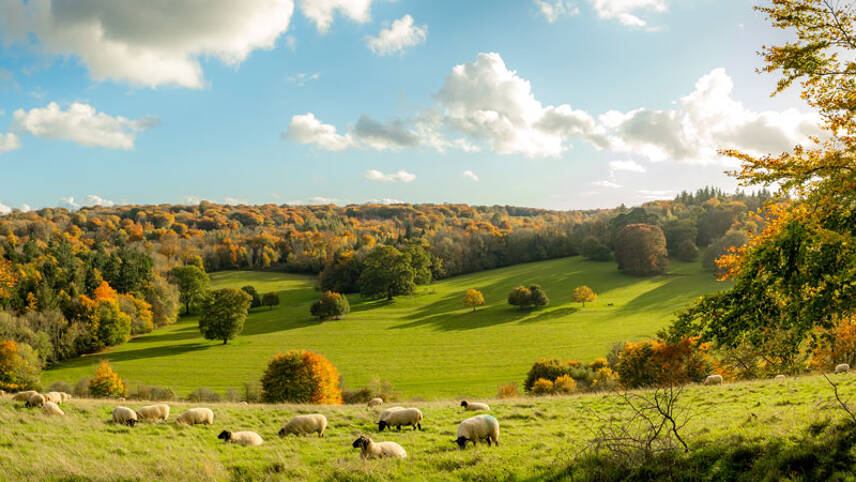Register for free and continue reading
Join our growing army of changemakers and get unlimited access to our premium content

Pictured: Sheep farming in the Surrey Hills, England
The ‘Farming Toolkit’ was unveiled on Thursday (11 January) after being commissioned last year by the UK Government’s Department for the Environment, Food and Rural Affairs (Defra).
Developed with input from GFI experts plus more than 100 farmers, the toolkit provides a framework for farmers to identify and understand nature market opportunities. It is suitable for farmers of all farm sizes, sub-sectors and regions, and covers information for farmers at various stages of their journey in this space.
For total beginners, an introductory guide and glossary are provided. The resource then includes a detailed step-by-step guide for assessing land, developing credits, attracting buyers and making the final sale.
This guide takes into account the particular challenges that tenant farmers will face in regards to involving landlords to the right extent and maintaining fair access to any private financial rewards for their work.
The launch of the toolkit has been timed strategically. From this month, developers of large housing projects will need to prove they have delivered a 10% biodiversity net-gain. Where net-gain cannot be delivered on-site, developers will have the option to purchase credits from external projects, verified by Defra.
Biodiversity net-gain requirements will be rolled out to small housing projects later this year and, in 2025, also apply to infrastructure projects such as roads and railways.
Moreover, Defra and the Environment Agency is currently welcoming funding applications from farmers seeking to partake in the Natural Environment Readiness Fund’s (NERIF) third round.
The fund provides grants to nature restoration project managers, intended to support them in exploring the monetisation of nature-based gains and carbon benefits. The NERIF application round will close on 16 February.
NERIF programme manager Andy Slaney said: “Understanding the opportunities that nature markets provide can feel like a daunting prospect.
“This pioneering GFI Farming Toolkit is an invaluable resource for the farming community when considering how to enhance nature and improve the climate resilience of their businesses whilst seeking to maintain a suitable income. We want nature markets to help the farming community transition to a sustainable state, this Toolkit will help anyone embarking on that journey.”
Bodies including the Food, Farming and Countryside Commission and the Agriculture and Horticulture Development Board have welcomed the launch of the toolkit.
Subsidy changes
Reacting to the toolkit launch, the Tenant Farmers Association’s chief executive George Dunn said: “It is of vital importance that farmers are rewarded for their work in delivering environmental outcomes and the management of natural capital.
“It is sad that in most cases, food markets and other markets for agricultural produce do not routinely factor in the environmental management costs involved. To date, farmers have been rewarded, to some extent through public funding but it is now good to see private markets being developed.”
Key changes include a 10% upsurge in the average value of agreements in the Sustainable Farming Incentive and Countryside Stewardship. This surge is driven by augmented payment rates, with automatic uplifts applied to existing agreements.
Defra has also simplified the application process for these initiatives; changes will take effect once the 2024 application window opens this summer.


Please login or Register to leave a comment.